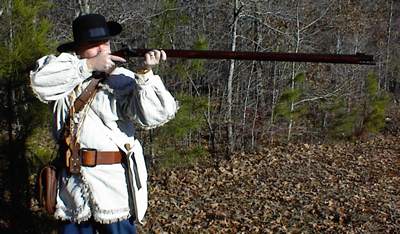CWPT Course
This week I was contacted by our friends at the Civil War Preservation Trust in reference to a photograph that I had taken several years ago. In 2008, I won second place in the CWPT’s photography contest for their Battlefield Threat category. The CWPT is currently developing a Civil War curriculum and creating a two minute film about battlefield preservation. My image, Modern "Raid" will be included. The film, as part of their curriculum, will be available on the CWPT’s website for free download to all, but specifically K12 teachers. They are also going to sell the complete curriculum in print & CD form (28 lesson plans with associated worksheets, PowerPoints, and exams) at cost to teachers who wish to have a hard copy. I am honored to have my image used in what promises to be an extraordinary teaching aid. Who better to educate the public about the importance of battlefields than the CWPT.
AND speaking of films…we are just days away from releasing our DVD. Stay tuned!
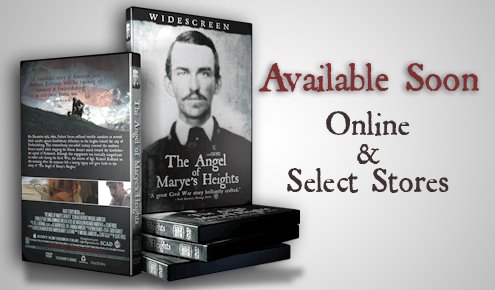
Guest Post
My recovery is going fairly well and I have my good days and bad days. Today is a good day because I get to share another exceptional guest post in my absence. Dr. Linda Sundquist-Nassie is a gifted teacher and historian who I have had the privilege of communicating with over the last few months. Linda has just been added to the list of contributing writers for Patriots of the American Revolution magazine and has some great pieces coming out this year. Today her post examines the Fitzhughs.
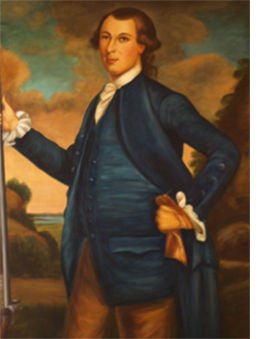 Treasures Beyond Measure
Treasures Beyond Measure
by Dr. Linda Sundquist-Nassie
I think those of us who love history are often sentimentally attached to family treasures and items that tell a piece of our history, remind us of a specific time and place, often connect us to a special relative, and actually give us a tangible link to both our personal history and our national heritage. Those pieces of furniture or silver, paintings or letters, diaries, textiles, weapons are all preserved so that our story continues and our descendants will be linked through us to those who lived before us, insuring our own posterity. (A wonderful book that explores the emotional connection, lore, and responsibility that our family heirlooms carry is Lisa Tracy’s “Objects of Our Affection.” It’s a lovely, emotional read that will connect with family historians everywhere.)
One of my favorite “treasures” ironically is not a tangible item at all, but still it links me to my ancestors and the accomplishments of their lives. I love the items that have been passed down to me beginning with my first ancestors that arrived here aboard the Susan Constant to Jamestowne in 1607, but I have found great interest in my family “mottos” that those English ancestors proudly displayed. Arriving from Europe, many came looking for new opportunities but sporting their connections to their European heritage and any claims to royalty or privilege that they had. Family crests, titles, mottos were proudly displayed as unique descriptions of specific family lines. Perhaps sometimes appearing presumptuous, but interesting and in some cases, inspiring for descendants to treasure, as a standard by which family members proudly identified their lives.
My favorite family motto comes from my Fitzhugh family line and it is one that I have chosen as my “motto”, my signature line and standard by which I have tried to lead my life, raise my children, teach my students, and “stay the course” for my life’s work. PRO PATRIA SEMPER was the Fitzhugh motto. Translated from the Latin it means “FOR MY COUNTRY ALWAYS”. What greater family treasure can there be then the gift of patriotic service and commitment to one’s country above all else? This motto defines patriotism, commitment, and faithfulness – treasures beyond measure.
If you investigate the Fitzhughs who fought in the American Revolution, you will find many participants, serving in a variety of roles, leading lives in step with their family motto: William Fitzhugh, elected to represent Virginia at the 1st Continental Congress in 1779 and a member of the Virginia State House of Delegates and State Senate in the 1780’s. He worked hard to help establish liberty in America and was a very close friend of George Washington. In fact, the last time George Washington left Mt. Vernon before his death, was to travel to Alexandria to visit William Fitzhugh. (An interesting note: William Fitzhugh’s daughter married George Washington Parke Custis, the adopted grandson of George and Martha Washington, and their daughter, Mary married Robert E. Lee.)
Another William Fitzhugh (there are many cousins with the same name) was a cornet of the 3rd Continental Dragoons in 1779. This unit was commonly known as “Mrs. Washington’s Bodyguards”; a unit in which he served until the end of the war. Two of his sons, Peregrine Fitzhugh and William Frisby Fitzhugh also served in the American Revolution. Peregrine, enlisted at the age of 18 years old in the Continental Dragoons, where he served and earned the rank of Captain. As an aide to General Washington, he was one of the original members of the Cincinnati. He served the entire war, excluding the time in which he was taken prisoner at Tappan and remained there for nearly two years until his exchange in 1780. His brother, William Frisby Fitzhugh served under Col. George Baylor’s regiment and later served until General Greene in the South until the end of the war. My favorite story is about a cousin, fondly known as William “War Billy” Fitzhugh. At the start of the Revolution, “War Billy” resigned his British commission, knowing that he could not fight against America. Living in Maryland with his wife and children, the British command told him that if he would stay out of the conflict, they would pay him half his salary and they would leave him alone, since by this point, he was nearly blind. He refused, so they imprisoned him and burned his house down, his wife and family barely escaping with their lives. Eventually, he was released, and he returned to the Maryland area and lived out the remainder of his life, near where he is buried today.
So many stories and so many events where people put their love of country ahead of their own personal hopes and dreams. It’s a fact that we need to remember in these times when personal comfort takes far too important a role ahead of wanting to do our patriotic duty. As a teacher, I see fewer and fewer children being taught by their parents the duty they owe their country as a result of the blessing of being a citizen of the United States. The sacred honor that they should hold needs to be instilled in the next generation of Americans. For me, my family motto is the greatest treasure from my ancestors that I hold. I love the paintings and furniture and quilts and diaries that have been passed down to me, but the daily reminder “For My Country Always” is my guide and my personal connection to my history and my family.
BIO: Dr. Linda Sundquist-Nassie lives in the foothills of the beautiful gold country of northern California, an area rich in American history and folklore. She has taught American history and literature in high school and middle school in a neighboring district for over 35 years. She is the author of “The Poetess of Song, The Life of Mary Shindler”. She is currently working on a multi-generational book about another branch of her family, scheduled for publication in the fall of 2012.
For those of you not on our email list...
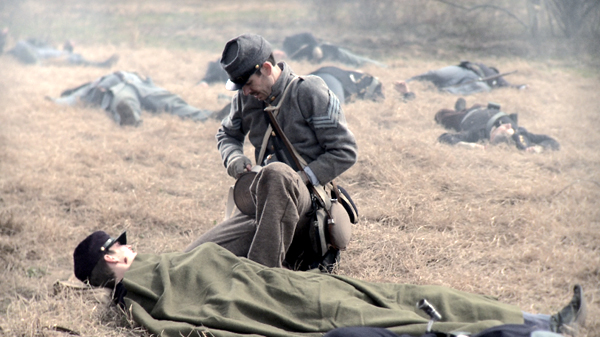
OWN YOUR COPY OF "THE ANGEL OF MARYE’S HEIGHTS" ON DVD
It is with great pleasure that Right Stripe Media can announce the official release date of “The Angel of Marye’s Heights” DVD as January 2011. This commemorates the beginning of the Sesquicentennial (150th Anniversary) of the American Civil War. This DVD will be available online in the coming weeks.
We invite you to share this announcement with your friends and view our dramatic short titled “The Mercy Scene.” This touching re-enactment depicts Richard Kirkland’s act of courage and compassion as we envision it on that fateful December day in 1862. Watch Video Here: http://www.vimeo.com/18233614
This is just one of the DVD’s bonus features. In addition to the newly enhanced half-hour documentary, you’ll get 6 additional videos including interviews and behind the scenes segments. Thank you for your support. We are pleased to make this remarkable story available to you. For more, visit the film’s website at www.theangelmovie.com.
Be sure to register at our CONTACT page to receive future email announcements. Clint Ross and Michael Aubrecht
Right Stripe Media LLC
www.pinstripepress.net/RSM.html
Remembering times that try men’s souls
Hugh Harrington (above) is a fellow author and historian of whom I have the greatest respect for. We share the same publishers at The History Press and Patriots of the American Revolution and I am doing everything I can just to keep up with him. Hugh’s incredibly long list of credits include multiple books on Milledgeville GA and insights on both Sherlock Holmes and Sir Arthur Conan Doyle. For more on Hugh’s published works visit his website at www.hughharrington.com/. We often chat via email and this week our discussion revolved around my last blog post on Washington’s crossing of the Delaware River. Hugh had a wonderful way of painting this event with words. He wrote:
It’s dark now in the Delaware River Valley. 234 years ago at this very hour it was dark, and cold, wet, miserable and frightening. Washington’s ragged, beaten army was lined up waiting their turn to cross the Delaware and almost certain destruction. They were crossing the river into the teeth of the enemy. If the Hessians knew they were coming the Patriot army would be slaughtered. When Washington went into battle he always left a route by which to retreat. Now however, there was no retreat. If defeated there was no escape; they could never get back across the Delaware. It was victory or death. Those cold, wet, shivering men walked all night to Trenton. This was the end of the war, it was the end of their lives. Just a week before Thomas Paine had written as the opening lines to The Crisis paper, “These are the times that try men’s souls. The summer soldier and the sunshine patriot will in this crisis, shrink from the service of his country; but he that stands it now, deserves the love and thanks of man and woman.” These men did not shrink. But, they must have been almost as surprised as the Hessians were when they won the battle. Their stunning victory literally saved the revolution. It was still a probability that the war would be lost but they had at least delayed the utter destruction of the revolution. We ought to remember - and especially on Christmas night - to give thanks to those men of 1776 who crossed the Delaware River, marched through snow and cold into almost certain defeat and annihilation and emerged the victors.
Christmas Crossing
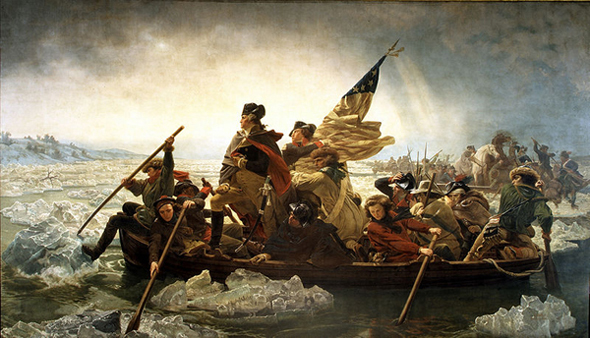
“Washington Crossing the Delaware” by Emanuel Leutze (1851)
“The promise of democracy was lost just a year into these revolutions. But if you had someone like George Washington at the helm, all could be saved.” - Carrie Barrett, MET
During this holiday weekend I would like to take a moment to acknowledge the anniversary of what I consider to be THE, most remarkable maneuver in American military history. On December 25, 1776, General George Washington and his troops executed a victorious surprise attack against Hessian forces in Trenton, New Jersey. What made this particular engagement noteworthy was the Continental Army's precarious crossing of the Delaware River prior to the battle.
Planned in complete secrecy, Washington orchestrated this entire maneuver right down to the last detail. On Christmas day he ordered his men to prepare three day's rations and outfit their muskets with fresh flints. Starting at 4pm, all available men, including officers, doctors and musicians were issued firearms and ammunition and told that they were about to embark on a secret mission. Marching in ranks of 8 across, the army departed as quietly as possible from their camp at McKonkey's Ferry. An unexpected storm blew in shortly thereafter, slowing the Continental's tight formations and pushing their arrival at the banks on the Delaware to 6pm, over an hour and a half after sunset.
Washington's chief of artillery, Henry Knox, was in charge of managing the logistics of the crossing. In addition to the infantry, Knox was also tasked with safely transporting eighteen pieces of artillery, as well as the horses required to move them. Adding to the difficulty of managing the boats, the Delaware River was congested with floating ice. In an attempt to set an example, Washington was in one of the first watercraft to depart. This bolstered the confidence of his men, many of whom could not swim.
Once across, Washington and his fellow Virginians formed a picket line around the landing area. General Adam Stephen was charged with covering the arriving Continentals and maintained a tight perimeter that saw no action. Once each soldier reached the other side, he was given the password that would allow him to move about and through the sentry line. "Victory or Death" was the official phrase. Throughout the night, the rest of Washington's forces crossed without any major incident, although Delaware's Colonel John Haslet fell into the water and was quickly rescued.
Unfortunately, the two other crossings below Trenton suffered multiple problems including treacherous currents and massive ice jams that prevented boats from passing. Colonel Cadwalader was able to transport a significant portion of his men across the river, but he was unable to get any cannons to the other side. Unable to support his infantry with any artillery, Cadwalader recalled his troops and did not attempt to cross again until after Washington had already been reported victorious.
After his entire force was in place, Washington split them in two columns, one under the command of General Greene and the second under General Sullivan. He then sent one column into Trenton via Bear Road and the other in from Pennington Road. This enabled the Continentals to launch a surprise attack from two directions and essentially choke the Hessians before they had time to react. As a testament to the success of Washington's strategy, the Continentals suffered 3 deaths and 6 wounded while the German forces had 22 men dead and 98 wounded. Washington's troops also captured 1,000 prisoners and seized a significant cache of supplies including muskets, gun powder and artillery.
Washington personally sent the following report to the Continental Congress informing them of his victory.
Head Quarters, Newtown
27 December 1776
Sir:
I have the pleasure of congratulating you upon the success of an enterprise lying in Trenton, and which was executed yesterday morning. The evening of the 25th I ordered the troops intended for this service to parade back of McKonkey's Ferry that they might begin to pass as soon as it grew dark, imaging we should be able to throw them all over, with the necessary artillery, by twelve o'clock, and that we might easily arrive at Trenton by five in the morning, the distance being about nine miles. But the quantity of ice, made that night, impeded the passage of the boats so much, that it was three o'clock before the artillery could all be got over; and near four before the troops took up their line of march. This made me despair of surprising the town, as I well knew we could not reach it before the day was fairly broke. But as I was certain there was no making a retreat without being discovered and harassed on repassing the river, I determined to push on at all events. I formed my detachment into two divisions, one march by the lower or river road the other by the upper or Pennington road. AS the divisions had nearly the same distance to march, I ordered each of them immediately upon forcing the out-guards to push directly into the town, that they might charge the enemy before they had time to form.
The upper division arrived at the enemy's advanced post exactly at eight o'clock; and in three minutes after, I found, from the fire on the lower road, that the division had already got up. The out-guards made but small opposition, though, for their numbers, they behaved very well, keeping up a constant retreating fire from behind houses. We presently saw their main body formed; but, from their motions, they seemed undetermined how to act. Being hard pressed by our troops, who had already got possession of their artillery, they attempted to file off by a road on their right, leading to Princeton. But, perceiving their intention, I threw a body of troops in their way, which immediately checked them. Finding from our disposition, that they were surrounded and that they must inevitably be cut to pieces if they made any further resistance, they agreed to lay down their arms. The number that submitted in this manner was twenty-three officers and eight hundred and eighty-six men. Colonel Rahl, the commanding officer, and seven others, were found wounded in the town. I do not exactly know how many were killed; but I fancy not about twenty or thirty, as they never made any regular stand. Our loss is very trifling indeed, -- only two officers and one or two privates wounded.
I find that the detachment of the enemy consisted of the tree Hessian regiments of Anspach, Kniphausen and Rahl, amounting to about fifteen hundred men, and a troop of British light-horse; but, immediately upon the beginning of the attack, all those, who were not killed or taken, pushed directly down the road towards Bordentown. These would likewise have fallen into our hands, could my plan have been completely carried into execution. General Ewing was to have crossed before day at Trenton Ferry, and taken possession of the bridge leading out of town; but the quantity of ice was so great, that, though he did every thing in his power to effect it, he could not get over. This difficulty also hindered General Cadwalader from crossing with the Pennsylvania militia from Bristol. He got part of his foot over; but finding it impossible to embark his artillery, he was obliged to desist. I am fully confident, that, could the troops under General Ewing and Cadwalader have passed the river, I should have been able with their assistance to drive the enemy from all their posts below Trenton. But the numbers I had with me being inferior to theirs below me and a strong battalion of light infantry being at Princeton above me, I though it most prudent to return the same evening with the prisoners and artillery we had taken. We found no stores of any consequence in the town.
In justice to the officers and men, I must add, that their behavior upon this occasion reflects the highest honor upon them. The difficulty of passing the river in a very severe night, and their march through a violent storm of snow and hail, did not in the least abate their ardor; but, when they came to the charge, each seemed to vie with the other in pressing forward and were I to give preference to any particular corps, I should do great injustice to the others. Colonel Baylor, my first aid-de-camp, will have the honor of delivering this to you; and from him you may be acquainted with many other particulars. His spirited behaviour upon every occasion requires me to recommend him to your particular notice.
I have the honor to be, & c.
Go. Washington
The site of Washington's crossing has become a hallowed ground on the American landscape and is forever preserved as Washington's Crossing National Historic Landmark, the nearby Washington Crossing Historic Park and perhaps the most famous of all markers, the Washington Crossing Bridge.







 Treasures Beyond Measure
Treasures Beyond Measure
